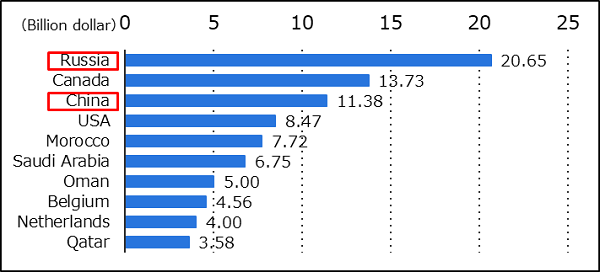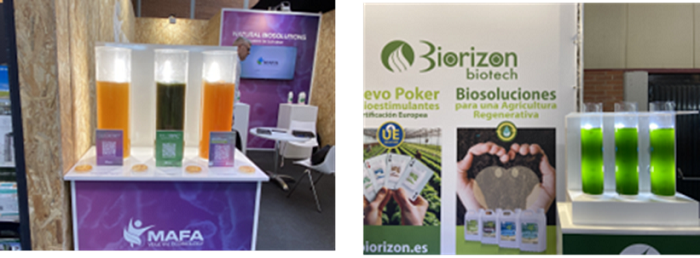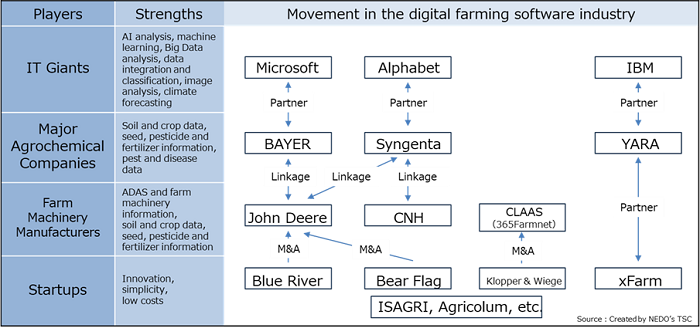“Agritech Report: From the Perspective of Food Security and Environmental Impact” English Version Released
-Analysis of the current state of global agriculture and trends in agritech development-
August 20, 2024
New Energy and Industrial Technology Development Organization (NEDO)
To coincide with the revision of Japan’s Basic Law on Food, Agriculture and Rural Areas in May 2024, NEDO has published the TSC Foresight Brief Report entitled Agritech Report: From the Perspective of Food Security and Environmental Impact. This report contains an analysis of the current state of global agriculture and the trends in agricultural technology development.
The report’s findings include research results that show bio-based fertilizers, which reduce supply-chain dependency risks, are gaining popularity. It also looks at how major agrochemical manufacturers in the EU and US with data related to agriculture are collaborating with IT giants who excel in AI and data management technologies to become the leading provider of digital farming technology.
1. Background
The world faces many food supply chain challenges, including widespread hunger in developing countries. Due to the COVID-19 pandemic, extreme weather, and Russian aggression against Ukraine, food prices have jumped since 2020. As the world’s population continues to grow and demand for food continues to increase, food security has become a global priority.
Other challenges facing agriculture are environmental issues such as the impact of pesticides on ecosystems and the pollution of groundwater and rivers due to fertilizer runoff. As the world targets carbon neutrality, the agriculture sector must reduce greenhouse gas (GHG) emissions and work toward sustainability.
The Japanese Diet passed a bill in 2024 to partially revise the Basic Law on Food, Agriculture and Rural Areas. The main points of the revisions include the reinforcement of food security and the transformation to environmentally-friendly agriculture, as well as enhancing productivity for sustainable growth.
This report summarizes the current state of global agriculture and looks at the trends in agritech development, from the perspectives of food security and environmental impact.
2. Research results
This report focuses on three agritech technologies related to NEDO’s work: (1) fertilizers, (2) precision farming technologies, and (3) Controlled Environment Agriculture (CEA).
NEDO’s technology development efforts corresponding to these overseas technology trends are also described in this report.
(1) Fertilizers
To reduce the use of synthetic fertilizers in response to the EU’s Farm to Fork Strategy and lower the risks that come with dependence on suppliers such as Russia and China, research and development of bio-based fertilizers, like biostimulants and biochar, is being promoted heavily in Europe. These use naturally-derived materials with low environmental impact such as seaweed and microorganisms. Low-carbon, nitrogen-based fertilizers that emit less carbon dioxide (CO2) during the production process are also being developed.
-
 Figure 1 Top fertilizer-exporting countries (2022)
Figure 1 Top fertilizer-exporting countries (2022)
Source: Created by NEDO’s TSC based on Statista’s fertilizer industry worldwide report
-
 Figure 2 Biostimulants exhibited at FIMA2024 to promote regenerative agriculture
Figure 2 Biostimulants exhibited at FIMA2024 to promote regenerative agriculture
(2) Precision farming technologies
Digital farming software, which aims to provide information to assist decision-making in all stages of farming, is becoming more accurate with the evolution of sensing and AI technologies. Until recent years its development had been led by major agrochemical companies, but now startups, farm machinery manufacturers, and even IT giants have entered the market. With complementary backgrounds in data and technology, these players are forming alliances in hopes of leading the field of precision farming technology.
-
 Figure 3 Movement in the digital farming software industry
Figure 3 Movement in the digital farming software industry
Source:Created by NEDO’s TSC
(3) Controlled Environment Agriculture (CEA)
CEA generally refers to the cultivation of crops and plants in a protected indoor area, and is positioned as a method of agriculture that contributes to the resiliency and decarbonization of the food supply. The US government is investing heavily in CEA. There are successful examples of mass production of high value-added foods such as strawberries, and further market expansion is expected.
3. Future plans
NEDO will continue to work on the development and implementation of various projects from the perspective of solving food security and environmental issues while taking international trends into consideration.
4. For more information, please contact:
NEDO Technology and Innovation Strategy Center (TSC)
Tel:+81-44-520-5200 E-mail:tsc-unit-2024[*]ml.nedo.go.jp
*To send an inquiry by email, please replace [*] with @ in the above email address.
